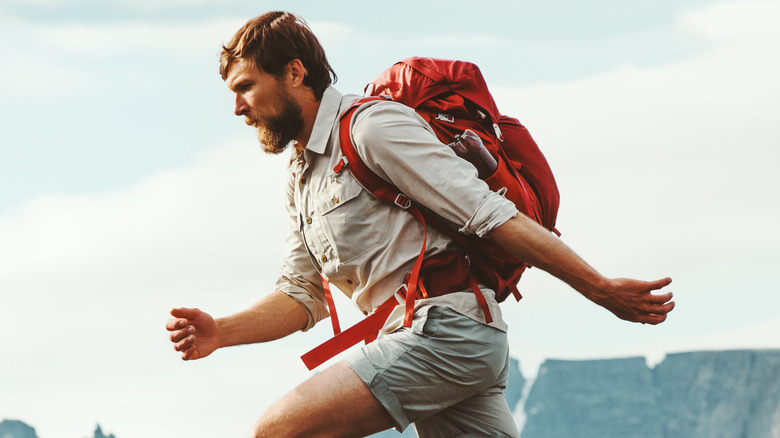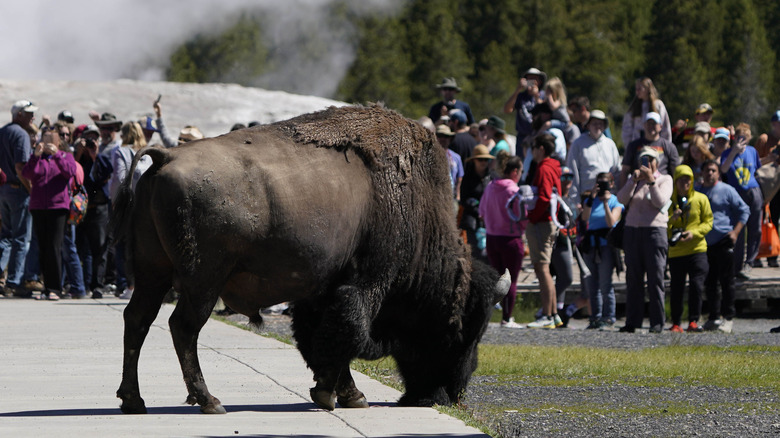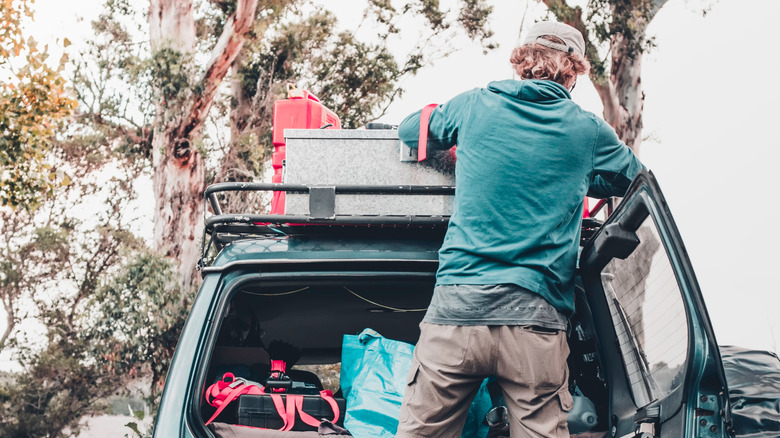Going Number 2 While Camping Just Got A Lot More Complicated
Everyone does it; all living things poop (even plants, sort of). As anyone who spends time in the great outdoors — or instead, just takes Rover on a walk around the block on the regular — is well aware, though, poop management outdoors can be tricky. Over the years, etiquette has developed, telling us how to handle organic waste in the woods, such as human and pet excrement. As more and more humans flock to nature, though — national parks in the U.S. are more crowded than ever, according to CBS News — we find ourselves facing a feces dilemma.
In this new normal, the old rules no longer apply and a whole new set of guidelines are now recommended for when it comes time to defecate in the wilderness. But if pooping is perfectly natural — excrement, in theory, is biodegradable, after all — then what's the big deal? Why not let it lie where it falls? Here's the lowdown on why the rules are changing regarding camping poop, why you should always clean up after using the bathroom au naturel, and what you should do the next time you or your golden retriever needs to take a No. 2 in the wild.
But won't poop just go away on its own?
Admit it: You're out for a walk with your dog when they take that distinctive doggy stance, the squat that's telling you it's time to go. You forgot a doggy bag in this instance, and you find yourself thinking, "It's okay, just this once. It's biodegradable, after all," and you walk off after your dog finishes its business without cleaning up. We've all been there. The fact of the matter is, though, that while poop will break down on its own through natural processes, you should always clean up pet waste — and more importantly, human feces — when using the bathroom in nature.
As Petfinder notes, outdoor excrement washes into waterways, adding excess nitrogen to the water and depleting oxygen — bad news all around. There are also a number of organisms that thrive in feces, from both humans and otherwise, such as giardia and salmonella. And in dog poop in particular, there can be roundworm and hookworm, among other creatures, which unattended feces can transmit to other animals. As far as human doo-doo while camping, the same rules apply. Animals or other humans may encounter it, stuff we eat — healthy and otherwise — can get absorbed into the ecosystem, and most importantly: It's gross! (Via Campendium.)
Human feces is particularly nasty stuff, in more ways than one
But as it turns out, there's a whole extra set of concerns when it comes to human waste in the outdoors when left as is. What's been already been mentioned about pets applies to humans to one degree or another. Humans, however, have all kinds of other things in our diet that get passed along when we poop: hormones from meat, preservatives from all kinds of food, and even antibiotics which, when absorbed into the natural ecosystem, are thought to contribute to bacterial antibiotic resistance, as Medical News Today explains.
Furthermore, most of our poop is not undigested bits of food, as many assume. Instead, it's full of bacteria, both dead and alive. While those beneficial little bugs living in our gut can be a good thing (sometimes yes, sometimes no), ingesting that stuff on purpose or otherwise is far less advisable for both humans and animals. There's an estimated 100 billion bacteria, in fact, per gram of stool, according to The Conversation. Just as with pets, take into consideration simple good manners: Nobody wants dog or human excrement on their shoe when they were otherwise just out for a walk in the woods.
What does the old poop wisdom tell us?
Etiquette around waste management in the wilds is nothing new, and up to this point guidelines have developed about what you should do when you really gotta go when you're far from home. Until now, when it's time to go, we've been told to first dig a hole, sometimes called a cathole, about 6 inches deep and at least 200 feet from water, trails, campsites, and other people. Once finished, bury the hole completely, and carry out all hygiene products used, according to Beyond the Tent. Burning said products should be avoided, as Trail and Summit notes.
Moreover, most public spaces and municipalities have laws and regulations about what to do with your poop, so be sure to make an informed decision before you take a No. 2. Also, if within a reasonable distance of an outhouse, porta-potty, or public restroom, then that's your best choice — try to hold it until those facilities can be reached. For real emergencies, serious campers sometimes even carry in their own camp toilets.
Why are our public spaces so crowded?
What partially motivates a rethink on outdoor waste management is just how popular our parks, open spaces, and wilderness areas have become, with thousands and thousands of people visiting our national parks and notable outdoor landmarks each year, according to Bloomberg. As Outside explains, those numbers are only growing, and the problem of too many people and pets, therefore, will only get worse. Nobody wants their first seasonal hike to be ruined by human or dog waste left aboveground to overwinter and freeze, only to find it melted come spring.
And after COVID-19 pandemic restrictions were lifted in some areas, folks were more eager than ever to lace up their hiking boots and hit the trail. Furthermore, it's also just a matter of quantity: The occasional camper or hiker pooping outdoors in a hole might be manageable, but the glut of feces from all those crowds is simply getting out of hand, as Outside goes on report. For these reasons, and more, the old rules about digging a hole to poop in are no longer practical. (Though all this might give some campers performance anxiety, it's never okay or healthy to hold it, according to Trail and Summit.)
So what's a camper to do?
So if you're wondering with your legs crossed and an anxious expression on your face just what an avid outdoors enthusiast is supposed to do when they really gotta go, the answer, according to Outside, is to follow the same guidelines you apply to your dog: Use a human-sized dog bag, sometimes called a wag bag, and carry your waste out with you. Never leave your waste — bagged or otherwise — for someone else to clean up. As Outside goes on to report on their "Outside Podcast," some outdoor places are now mandating visitors carry wag bags, such as popular spots like Utah's Bears Ears and Colorado's Rocky Mountain National Park, among others.
As Ranger Rick Norman, supervisor for Colorado's Pitkin County Open Space and Trails, said on that podcast episode (available on the Outside website), "We have an extreme amount of users," in our outdoor spaces, "[a]nd it's only growing and growing ... there's so many people using all of our trails and doing our backpacking loops," Norman also said. "[I]t just makes sense to not have human waste buried everywhere ... [e]veryone needs to do their part with their doo-doo."





